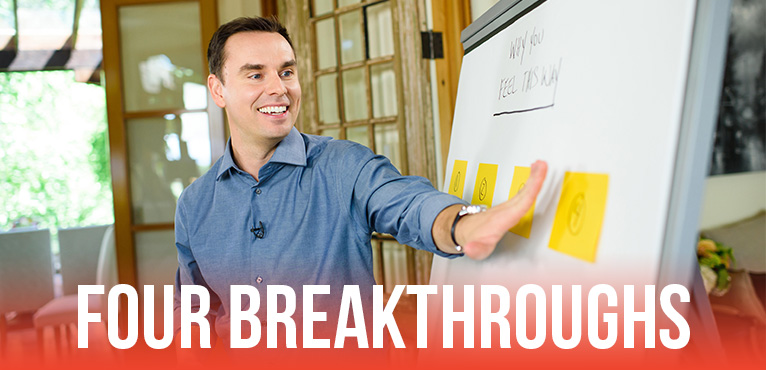SUMMARY
- “Autonomy means you let the other person be the other person. You let them express themselves fully, be who they really are, and choose to align or not.”
- Are you a leader looking to up your game? In this episode, learn the 2 things you MUST add to your skillset when leading others!
- “It’s so important as a coach, as a leader that you understand what autonomy means: let their authenticity fly.”
- Let today’s training show you why autonomy and alignment is crucial when it comes to leading others and achieving your goals!
- Watch the video to get the full training.
- Already have the High Performance Planner and CRUSHING each and every day? Let’s celebrate you! Take a photo with your planner and use #GrowthDay so we can find you on social media!
HOT NEWS & DEALS!
-
Get the High Performance System!
If you want to level up personally and professionally, High Performance System is the resource you need. The High Performance System will guide you through developing and implementing the 6 science-backed habits that will move the needle from ordinary to extraordinary. Develop the habits that lead to long-term success, positive relationships, and healthy well-being! Get the High Performance System!
-
Get the GrowthDay app!
Make self-improvement a way of life and get the GrowthDay app! GrowthDay features all your personal development tools, coaching and community in one place. Write your journal, track your habits, take wellness challenges, watch live influencers teaching new life strategies, and join a global community of positive and supportive high achievers excited to improve their lives! Get the app on Apple app store here. Get on Android here. Get desktop here.
DID YOU KNOW?
I give weekly prizes, gratitude and shout-outs to our students, so post a screenshot or video on Instagram and use #TheBrendonShow! I can’t wait to hear your thoughts about this episode!
RELATED POSTS
5 Must-Do Practices For Great Leaders
How to Become Unstoppable
Doubt Wins No More Mondays
How to Master Motivation
Get Out of Your Own Way with Dave Hollis






FULL TRANSCRIPT
[The following is the full transcript of this episode of The Brendon Show. Please note that this episode, like all TBS episodes, features Brendon speaking extemporaneously–he is unscripted and unedited. Filmed in one take, The Brendon Show has become one of the most viewed unscripted, direct-to-camera self-help series in the history of YouTube. It has also been the #1 Podcast in all of iTunes and is regularly in the top podcasts in Self-Help and Health categories around the globe. Subscribe to the free motivational podcast on iTunes or Stitcher.)
Leadership is all about alignment and autonomy. And your job as a leader is like a sculptor, like an artist. And the two tools that you have as an artist, as a leadership artist, they’re both chisels and you got to go shape something. You’ve got an alignment chisel and you’ve got an autonomy chisel. And you have to use these two to shape your culture, to shape people’s behavior, to shape how you direct things, you’re an artist. And it takes artistry to understand them too. So let me talk about each one of them.
1. Alignment
Okay, the first one is alignment. Your role, your position, or the influence that you’re developing with other people, which we’ll talk about, is so much about you learning, how do I align people towards that vision, that vision decision? How do I align everyone’s thoughts, feelings, beliefs, efforts, toward something significant? How do I align everyone’s thoughts, feelings, efforts towards something significant? You’re really playing an alignment game. I hope by now you’ve read my book, “High Performance Habits.” I’m so blessed with the success of that book, but also, never worked harder on any research study in my life than “High Performance Habits.” But one of the things I always hear from readers literally around the world is, the love of that one story where I tell about the story of the woman who she discovered as a striver, her whole life, she could get things done, she could knock off the to-do lists, she could make it happen, she could set the plans, she could mobilize people, she was a high performer. She was great at what she did.
But one day she realized that achievement wasn’t her problem. She kept thinking she had achieved the next thing to be happy, achieve the next thing, achieve the next thing.
And then one day she realized actually achievement wasn’t her problem, alignment was her problem.
She was getting things done, but it wasn’t aligned with the truth of who she was. She was capable, but a lot of her efforts were all over the place and they were aligned or focused. She wanted to live a great quality of life, but her lifestyle and work style weren’t in harmony, so that she could enjoy or be satisfied by her efforts. And so she was great at achievement, terrible at alignment, so she was miserable. Wow, I literally can still remember her voice when we had that breakthrough, as I was coaching her, she was like, click. She got it, “Oh, I’m good at achieving, but I suck at alignment, no wonder I’m miserable.”
Well, guess what, that comes into your family too. That comes in your personal life. That comes into your work life. That comes into your teams. It’s like, you might be getting a lot done but if people don’t feel aligned, the culture sucks. You might be getting a lot done but if you don’t feel aligned, you’re getting the wrong things done. You might be getting a lot done but it’s not aligned with your true interests, your true passions. Things that draw from you, that twin powers of curiosity and enthusiasm. If it’s not aligned with that, oh, you can do it all day long but now it starts feeling miserable even if it contributes, even if it makes a difference.
Some of you are doing great things that make a difference in the world and you don’t care about anymore. And you’re torn up and guilty inside and you feel shame. I have this opportunity to make a difference, I’m not doing it, what’s wrong with me. There’s nothing wrong with you. It’s not an opportunity that’s aligned with you. It’s nothing wrong with you. You haven’t found alignment yet. Either you got to get your mind right to be in that vision decision. You have to summon yourself and like, all right, I got to realign here. I got to realign, let me get in this game, let me be here, let me roll together or you got to get out of the boat, because you don’t want to be that guy or gal with that aura and you’re moving that rudder all over the place, ruining everybody else’s alignment and their speed.
You’ve got to take accountability like leaders, if you’re in the wrong place, you’ve got to remove yourself fast. Dido, if you’re the leader and you’ve got someone who you’ve said, “Hey man, put that order in here at the same time we’re all doing it, go like this. Hey, are you okay back there? Do you need anything back there? Seems like we’re not in alignment here. Got to get in line here, what do we have to do? Let’s have some conversations. Oh, you can’t get alignment, you refuse to get in alignment, get out the boat. You can’t have people who are misaligned on your team, you just can’t do it. Now, I know that brings up the other person but, what if that’s my husband? What if that’s the kids? It’s like, okay, great. Then you take that ability for yourself to stay entirely aligned with what’s important to you, but then you have to come together on what that decision is for them to move forward towards it. Those things are all coming together.
2. Autonomy
Now I said, you have two tools. One is alignment and the other one is autonomy. Autonomy. I think in the last decade, the word trust got a lot of play, which I love. But I think autonomy is one of the actual tools that scopes that outcome. Autonomy means you give other people decision-making authority and trust to do stuff.
Autonomy means you let the other person be the other person. You let them express themselves fully, be who they really are, and choose to align or not.
In other words, autonomy means, to hold up the autonomy tool, you have to put down the control stick. You have to go, “Okay, all right I’m going to hand you some power here to make this decision or do this thing.” Or autonomy means, “I’m just going to let you do your thing and I may be okay with it, as long as you’re aligned, be you.” I mean the famous story—and I have my executives always read this book called “11 Rings” and it’s the story of Phil Jackson taking the Chicago bulls to six rings and then the LA team too I think, five rings if I remember right. An absolute, probably the best coach living today. And his story is so extraordinary and he shares in the book and as these talks of the famous story of, you know, you had Jordan and Pippin and then some changes, and then you had Dennis Rodman, this wild character, this person who was uncontrollable by other teams, who’d been fined and sanctioned and almost kicked out of the NBA.
And no one could get a hold of this guy. And you see that what Phil was a master at was allowing Dennis Rodman to be Dennis Rodman, making sure that he was part of the process, making sure that he understood where everyone is going, what the needs were, where we were aligned, what we’re working on, but allowing Dennis to be Dennis. Rodman does the Rodman thing.
And I think it’s so important as a coach, as a leader that you understand what autonomy means: let their authenticity fly.
Let them let that authenticity be part of it, don’t micromanage it, don’t control it, don’t cut it out of existence. Let people be who they are in your family, on your teams and demand that of yourself too, right?
Demand that of yourself, you are authentic, demand of yourself, that you are autonomous and not just pushed around doing everything else everybody else says to do.
That’s personal development 101 guys. We’re in GrowthDay, we got to talk about it. It’s critical. I want you to think about that. You’ve got these two tools to shape things. Notice micromanagement is not in those two hands. Be very cautious my friends, that’s where people mess it up all the time. You micromanage the kids, what happens? They don’t develop autonomy. What happens? They follow the wrong crowd. You have to be careful. It happens in every area of our relationships. You micromanage that spouse, this has to go here, this has to be this way. At some point, they’re like, “Geez, I feel like I’m in a prison here, this is crazy. Why does everything have to be an exact way all the time? It’s like, let me be a person. Let me do my thing. You have to be careful. You have to be aware. You got to give them autonomy. You got to keep people aligned. It’s one of my favorite topics in leadership. I hope this supports you all.
